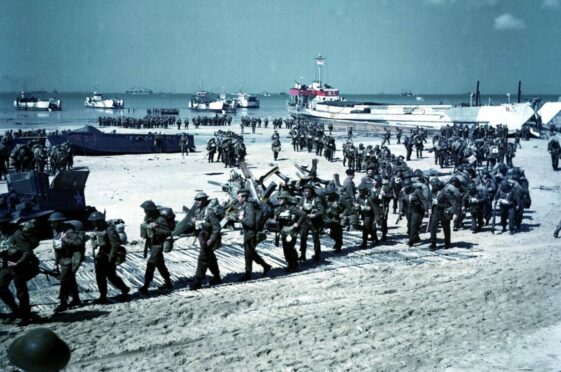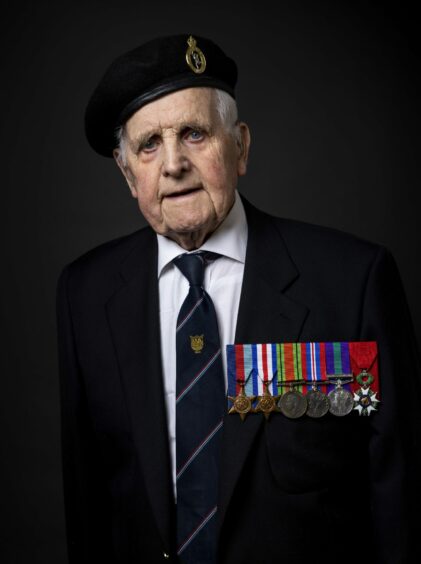
It was one of five beaches where history was forged and lives were lost on June 6, 1944.
More than a 1,000 young men died or were injured on Juno Beach – the Allies’ code name for one of the five landing sites – as D-Day turned the course of the Second World War.
Canadian soldiers were tasked with taking the beach and now the contested future of the strip of land in northern France is causing consternation across the Atlantic after a French property firm, Foncim, revealed plans for a 70-unit condominium at Courseulles-Sur-Mer, Normandy.
Cindy Clegg, a spokeswoman for the group Save Juno Beach told CBC, the Canadian national broadcaster: “It was a remarkable battle and the examples of fearlessness and courage and bravery were outstanding.
“And now to think that there are condos going up right next to the beach, where people can go on holidays and hoot and holler and play their radios loud on this battlefield just made me sick to my stomach.”
Juno was one of five beaches in Normandy, France, that was stormed by the Allies on D-Day, June 6, 1944. On Juno beach alone, there were 1,074 Canadian casualties, including 359 killed.
The site is currently home to the Juno Beach Centre, a privately operated Canadian museum that has been open for nearly 20 years.
Nujma Bond of the Royal Canadian Legion, said: “Any action that detracts from the sacrifices of those who served at Juno Beach is a wrong course of action.
“The Legion was disturbed to learn of this planned development and we are currently discussing next steps to respond to this potential intrusion upon sacred ground.”
Robert Hage, a retired diplomat with the country’s Global Affairs Institute, said Canadian diplomats should reach out to their French counterparts to stop the development.
He said: “We should get together and try to stop it. It would likely close the museum for two years as they did their construction and then they have to face all the other traffic, and it’s just not made for this sort of thing.”
John Mitchell, 97, a former Army signaller from Ayrshire, was just a teen when he when he hit Juno beach alongside the men of the Canadian Scottish Regiment. Many men in the Canadian unit were Scots or of Scottish descent.
John – who received the prestigious Legion D’honneur from the French government in recognition of his role on D-Day – said he sincerely hoped access to the beach would always remain free as “the price has already been paid”.
Former Signalman Mitchell said: “I have been over to France since the war and they were so kind to veterans.
“The respect we got in France was tremendous so I am sure they will be respectful of the beaches. The French people know very well the price has already been paid for these beaches.
“It is up to the French to decide what they will do with these sites but I am sure they know what they are doing.
“When I visited, it was so emotional to have young children thanking you for helping to free their country during the war.
“I am sure they will treat the landing beaches with respect. It might be a good thing to have people go there and enjoy the beach and enjoy the peace.
“I just hope they never charge people to get access to the beach. As I say, that price has already been paid in full.”
Former private Mitchell was called up in 1942, aged 18. He came ashore with Canadian troops on Juno on D-Day Plus One – the day after the initial invasion.
This was the same day that the elite troops of the German Waffen SS launched a counter attack. He said: “We set out on our journey not knowing what might lie ahead. Most of the troops on board were Canadians, out to make up for their treatment at Dieppe.
“When we were at sea, news came through about the landings and we knew for certain that this was not another exercise, but the real thing.
“For many years, we tried to forget about these things during the war. Even now, there are some things we don’t talk about.
“We went on as far as we could to try and find the rest of our unit – some of whom had landed with bicycles on the first day.
“We went so far until we were told to stop unless we spoke fluent German. We were ordered to pull in off the road on to the edge of a field behind a Canadian truck.
“When we could move in the early morning, the Canadian driver drove forward a couple of yards and hit a mine and the truck was destroyed. There are some incidents that you do not forget.”
Mitchell’s unit fought through France, then Belgium, Holland and finally into Germany in April 1945.
Mitchell, who is now a grandfather, added: “When the news came of the German surrender I just sat at the wireless. It was a non-event as far as we were concerned, no celebrations and no reaction. But you were glad, knowing you’d come through all right.
“I am still here. I was one of the lucky ones.”
Foncim want to erect a 70-unit condominium development called Domaine des Dunes on Juno Beach, close to the Juno Beach Museum and the Seulles River. Construction work could begin this September.
Organisers of the Juno Beach Centre said the move was “an existential threat to the Juno Beach Centre and the Canadian memorial presence in Normandy”.
A spokesman added: “The French deserve to enjoy the freedoms our veterans’ sacrifice brought them. However, the Dunes project was created without input from the community or from the Juno Beach Centre. We have great concern for the impact that this will have on the Juno Beach Centre.”
Historian James Holland is a fellow of St Andrews University and author of the book Normandy ’44: D-Day And The Battle For France.
He said: “Juno is a very interesting one. It was one of the biggest bridgeheads on D-Day and proportionally they suffered the greatest losses there.
“On D-Day Plus One, the Canadians rebuffed the 12th SS Panzer Division – they were hardened, fanatical troops.
“These soldiers threw their full weight against the Canadians and they stopped them in their tracks and managed to save the whole bridgehead.
“Juno and the Canadians don’t tend to dominate the narrative like the Americans and the British, but their achievements are very impressive.
“They saved the day there and proportionally, their losses were worse than at Omaha Beach.
“Time doesn’t stand still though. Tourism is a big thing in Normandy. There are many memorials in Normandy to the Scottish and Canadian troops. I am sure they will never be forgotten.”
Dr Claire Armstrong, chief executive of Legion Scotland, said: “We understand veterans’ concerns about this development given the historical significance of the beach.
“While this is ultimately up to the French authorities to decide, it is vital that battlefields are treated with the utmost respect and any development maintains public access to the beach.”
Foncim did not respond to requests for comment.

Enjoy the convenience of having The Sunday Post delivered as a digital ePaper straight to your smartphone, tablet or computer.
Subscribe for only £5.49 a month and enjoy all the benefits of the printed paper as a digital replica.
Subscribe